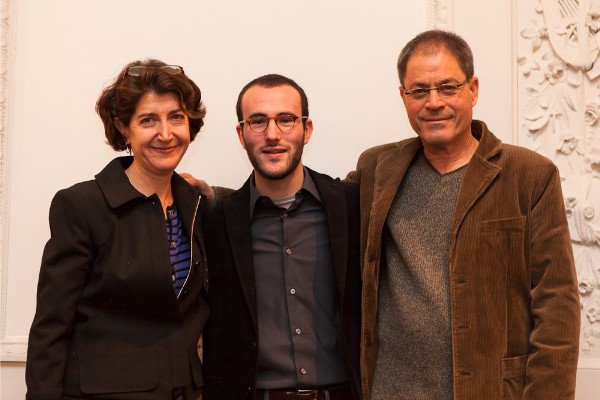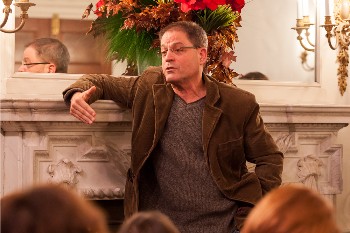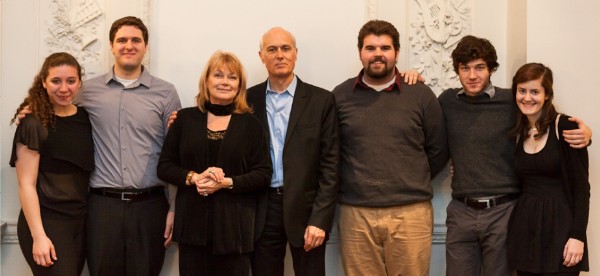Theater Commentary: A Complex View of Life, Death, and Combat in Israel — “At Night’s End”
A staged reading of an illuminating play by Motti Lerner about the devastating impact of war on men and women in Israeli society.
At Night’s End by Motti Lerner. Staged reading directed by Melia Bensussen. Presented by Israeli Stage. February 11th, 2012 at the Goethe Institut, Boston MA.
By Ian Thal
Israeli playwright Motti Lerner and Boston-based director Melia Bensussen had initially planned their workshop of Lerner’s new play, At Night’s End to be presented at Emerson College. However thanks to Israeli Stage, the Boston-based troupe dedicated to presenting readings of Israeli plays in translation, the workshop had its American premiere as a public reading at the Goethe Institute.
Avner (Dale Place) and Dalia (Karen MacDonald), two prominent lawyers, are making final arrangements for their son Gadi’s (Patrick McDonald) wedding. They have picked up their eldest son, Doron (Patrick Curran), who for the last five years had been living abroad. Their youngest son Roee (Benjamin Kabialis) and his girlfriend Shelly (Kayla Foster) soon arrive. It quickly becomes clear that Gadi’s fiancé Einat (Abby Goldfarb), a law student (and so another addition to the legal dynasty) is also Doron’s ex-girlfriend. Were this play set in America, it would have been the set up for a family dramedy.
Lerner, however, explores the tragic settings: this family reunion is set in Haifa in 2006, during the height of what Israelis call the Second Lebanon War: Roee has just returned from combat and is suffering from post-traumatic stress disorder. Both he and his parents have attended funerals for fallen soldiers in the last few days. Shelly’s parents’ house has been damaged by a Hezbollah rocket. Hotels and restaurants are closing and there is a possibility that the wedding be moved to Tel Aviv. Meals are interrupted as family members storm from the table; no one can sleep the whole night through. Scenes are punctuated by explosions.
In his essay, Playwriting in Wartime Lerner writes about the importance of exposing the “causal infrastructure of the war” as it cuts across the lives of characters whose obligations to family, society, national institutions, and self-preservation are at odds. In a nation such as Israel, which is continually threatened by hostile neighbors, military service is mandatory for nearly all able-bodied citizens. Amongst the families of the political and social upper crust, regardless of party affiliation, the pressure is not merely to serve, but to excel: they must become officers, serve in elite units and be tested in combat.
However, because Israel is also a democracy, one that prides itself on having the most moral military in the world, the obligation toward fair dealing places great ethical demands on its soldiers. It is not enough to show bravery and cunning on the battlefield — you must adhere to strict rules of engagement.

Director Melia Bensussen, Israeli Stage Honcho Guy Ben-Aharon and playwright Motti Lerner. Photo: Q Lam
In the midst of combat, Roee killed a captured Hezbollah commander. Though there is not sufficient evidence of wrong doing to instigate a court martial, it is not the first time Roee’s judgment has been questioned. Even if Roee is innocent of any crime; even if his family of lawyers and combat veterans believe he acted properly (the family law firm has frequently defended soldiers), his commanders are unwilling to take further risks and transfer him to a non-combat role where he will not be eligible for officer training, which would preclude him from a career in the family law practice or in politics.
It should be noted that in the question and answer session that followed the reading an audience member, who said he had served in the Advocate General of the Israeli Defense Forces, was incredulous that a soldier with Roee’s record would have been allowed to return to combat duty.
In this family each man has both risked his life and taken lives in combat. Each grapples with the psychological trauma generated their experiences: Avner, who takes pride in having been on combat duty at the birth of each of his sons, despite the daily rocket attacks, insists on holding the wedding in Haifa as proof that neither he, nor his family, nor his guests would be intimidated; Doron, the eldest, has been living as an expatriate in Manhattan and is constantly popping pills; Gadi, the middle son, lives with the knowledge that he must report for combat duty immediately after the wedding; Roee simply wants to return to combat and relive the experiences that leave him unable to eat, sleep, or return phone calls.
The women in the play suffer as well: Doron had been an abusive boyfriend to Einat before she left him for Gadi; Roee resents any attempt Shelly makes to comfort him and, even as he refuses to let her make love to him, he attempts to pressure her to purchase his return to combat duty through sexual favors; Dalia despite her own accomplishments outside the home, is ignored both by her sons and her husband.
Though this family portrait is less-than-flattering, it is a far cry from the crude caricatures presented by English playwright Caryl Churchill’s Seven Jewish Children: A Play For Gaza, a short play that has been received considerable international success in recent years. In Churchill’s play, Israelis are not subject to real threats like daily rocket attacks, invasions, and neighboring states that openly endorse Holocaust denial and genocidal fantasies. Lerner, a critic of Israeli military culture, faces these pressures. But he, unlike Churchill, wrestles with the conundrum of how to integrate traumatized warriors into civilian life.
Lerner writes as an act of tikkun. “Tikkun” is a Jewish concept often translated into English as “to repair” or “to perfect,” though during the question and answer session and in his essays Lerner renders it as “to reform.” The 2006 war was different than previous Israeli wars Lerner had lived through because the attacks struck deep into Israeli population centers, forcing him to ask a new elemental question: not whether the Israeli military could prevail in future wars, but will Israeli civil society survive future wars?
In order to inflame hostility towards Israel, Churchill’s play largely portrays Israelis as European interlopers who have been left morally stunted and psychologically infantile because of their experience and understanding of the Holocaust. Lerner’s work exposes the trauma that war places on Israeli families and civil society, but for the purpose of opening up serious dialogue about how to make Israel a better land for his grandchildren. In short, while Lerner’s Israelis are struggling under genuine historical and social pressures, Churchill’s Israelis have no real world context beyond how the dramatist imagines Jews and their approach to childrearing.
Because of its complex portrayal of post-traumatic stress disorder in military families in Israeli society,At Night’s End deserves a full production and, though intended for Israeli audiences, needs to be seen well beyond that country as an antidote to the often disappointingly simplistic portrayals of the Israeli-Arab conflict.
Motti Lerner studied mathematics and physics at the Hebrew University of Jerusalem, and theater in London and San Francisco. From 1979 to 1984, he was director and playwright at the Khan Theater in Jerusalem. Since then, he has been a freelance playwright and screenwriter for the major theaters and TV channels in Israel, as well as a lecturer in political playwriting at Tel Aviv University. He has also been writer-in-residence at the Center for Postgraduate Hebrew Studies in Oxford, Visiting Drama Professor at Duke University, USA, and frequently lectures at European and American universities on Israeli theater, especially in relation to the Israeli-Palestinian conflict. Lerner has written many plays and many TV films and drama series. His plays have been produced in the USA, England, Germany, Switzerland, Austria and Australia. He has received many awards including the Israeli Academy Award for Children`s Drama (1980), the Meskin Play of the Year Award (1985), the Prime Minister`s Prize (1994), the Israeli Motion Picture Academy Award for Best TV Drama (1995) and Best TV Feature Film (2004).


